Pre-and Post-Nutrition Tips for Quarantine Home Workouts
Pre-Nutrition Tips for Home Workouts
Watch Video Here
During this time where most of us do not have access to a gym or spin studio, the questions arises if we still need to be fueling for our at home workouts, and the answer is yes! We are going to go over the basics of pre-workout fueling, and go into more detail about when fueling during exercise is recommended!
When thinking about getting ready for a workout, the first thing you want to ask yourself is, how much time do I have? The closer we get to performance, the smaller we want our snack to be, and the more carb dense. The reason that quick carbohydrates are recommended within the hour prior to exercise, is because they lack fiber and get digested very quickly. This allows for easy digestion, so the food won’t be sitting in your stomach while you are working out.

The further you are out from a workout, for example, having a balanced breakfast is always recommended if you have the time. One question that I get a lot is, “Should I eat something before my 6:00 AM workout?” And my answer is always yes!
Not eating before a workout, is like driving a car on an empty tank. Your body doesn’t need a lot of food prior to a workout, just something to raise your energy by getting glucose, or carbohydrates, into your blood stream, and to your muscles.
Now taking a look at Intermediate fueling, or during exercise nutrition. The rule of thumb here is that if you are working out for under an hour, extra fueling is not necessary.
When thinking about workouts, or exercise, that is going to be lasting longer than 60-90 minutes, then fueling during performance can be beneficial! Under 60 minutes would include a Warrior Health and Fitness workout, a spin class, or a run!
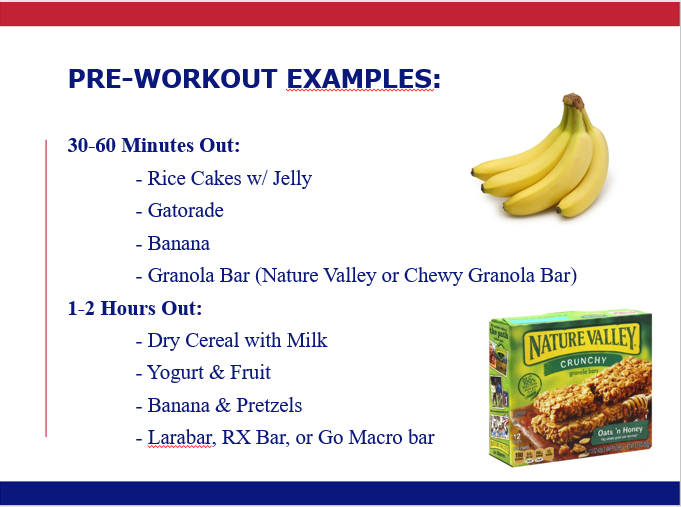
Now looking at exercise going above 60 minutes, the standard recommendation is 30-60g of carbs per hour. My favorite example to use here is the Boston Marathon – running causes your whole body to be moving, moving up and down, so the last thing you want is to eat something that won’t get digested well and end up with a stomach cramp. Most runners utilize gu’s and gel’s since they are easy to pack and don’t require a lot of effort to consume while running.
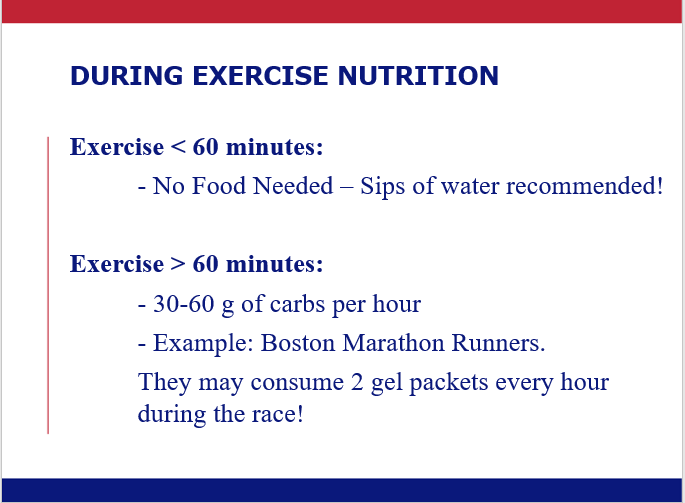
Here is a sneak peak to a marathoners fueling plan for race day! They are always carb loading for 3 days prior to the race, and then fuel during the race every 45-60 min. The runner would consume the recommended dose of carbs to help them maintain blood sugar levels and to also help continue fueling their brain and muscles.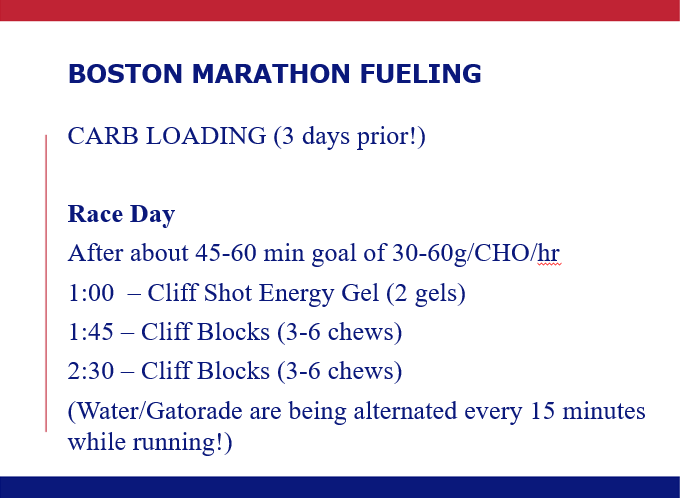
Here are some other examples of intermediate fuel sources. As you can see all of these are quick carbs so they get absorbed and broken down quickly.
Granola Bars
Dried Fruit
Pretzels
Banana
Crackers
Gu’s and Gel’s
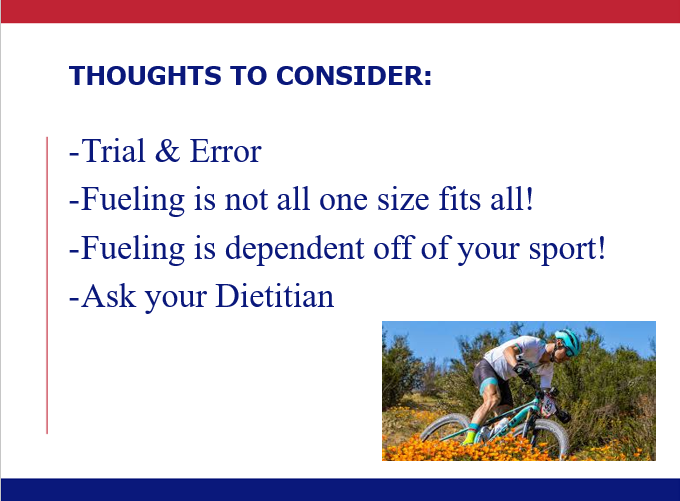
A few things to consider when coming up with your customized fueling plan– it is a trial and error process! One food may work for your teammate but may not work for you, you have to test and try different things out to find out what works for you.
Fueling during exercise, is also dependent on your sport, and if you have specific fueling questions, it is always best to ask your dietitian for guidance over a blog post on the internet.
Post-Nutrition Tips for Home Workouts
Watch Video Here
Now here is a question that I get from so many athletes, in regards to recovering from a workout. “I had a protein shake after my workout today so I am good right??” — Today I am going to walk you though a proper recovery, and how to make the best our of your workouts!
To start off, the answer to the above question is no! The three things to remember after a workout are Carbs, protein, and fluids. To recover and build muscle, your body needs both carbs and protein, and surprisingly it needs more carbs than protein.

Post workout nutrition should be consumed within 45 minutes of a workout. The composition should be a 4-1 or 3-1 ratio or carbs to protein. After a workout, your muscles have been torn, and your glycogen (or the storage form of glucose) in your body has been depleted. The purpose of recovery nutrition is to replenish glycogen stores, and deliver the necessary protein to your muscles to growth and repair.
Here are some other examples of post-workout recovery snack ideas!
Chocolate Milk
Banana and Peanut/Almond Butter
Fruit and Yogurt/Milk Smoothie
Graham Crackers and Peanut Butter
Yogurt and Granola
Protein Shake and Banana
Larabars, GoMacro Bars, RX bar, and Luna Bars
Do you always need a post-workout snack? The answer is no! A post workout snack is only needed if you are not able to eat a meal within 45 minutes of a workout. For people who workout first thing in the morning, then shower, and then have to drive to work, having a snack packed and ready for you after your workout would be a great routine to implement. It would ensure that your body has what it needs to recover, and it can tide you over until you can get to breakfast.
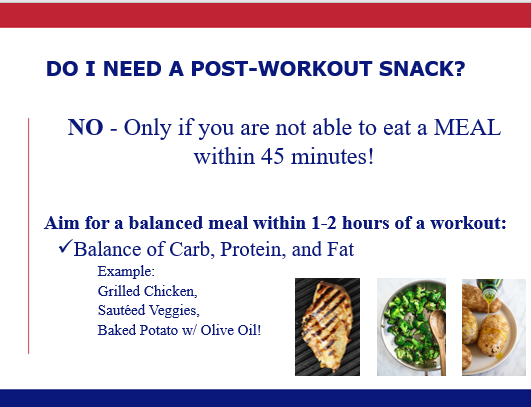
The recommendation is that you also consume a balanced meal within 1-2 hours of a workout. This includes a balance of carbs, protein, and fat. An example meal could be grilled chicken, with sautéed veggie, and a baked potato with olive oil.
Now if you are someone who works out early in the morning, and then has access to a balanced meal within that 45 minute window, here are some ideas that you can prepare for yourself either at home or work!
Toast w/ fried eggs and avocado
Oatmeal w/ berries and nuts
Yogurt w/ granola, berries, and nuts
Cheerios w/ banana slices, sliced almonds, and milk
Smoothie: fruit, spinach, protein powder, almond milk, and nut butter
Protein powders can be convenient, and can help people ensure they are meeting their protein needs if they are elevated. One thing to keep in mind is that the supplement industry is not regulated. As a sports dietitian, I always recommend products that are tested and certified by a third party. A common one on vitamins is USP – this ensures that the product is clean, and safe fro consumption. NSF is a certification on protein powders, creatinine supplements, and BCAA’s – this certification is specifically for athletes but can also be used for the general population.

All in all, post-workout nutrition is a trial and error process. Finding the right balance and or creating a plan that works for you takes time! Ask your dietitian for guidance and support if you need ideas in regards to your individualized recovery process.

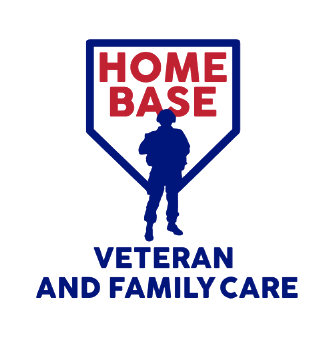
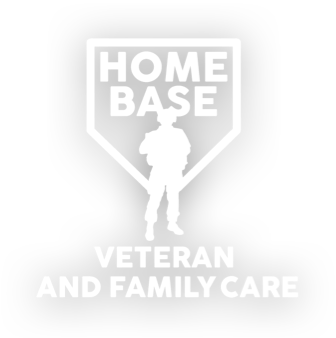 Home Base
Home Base